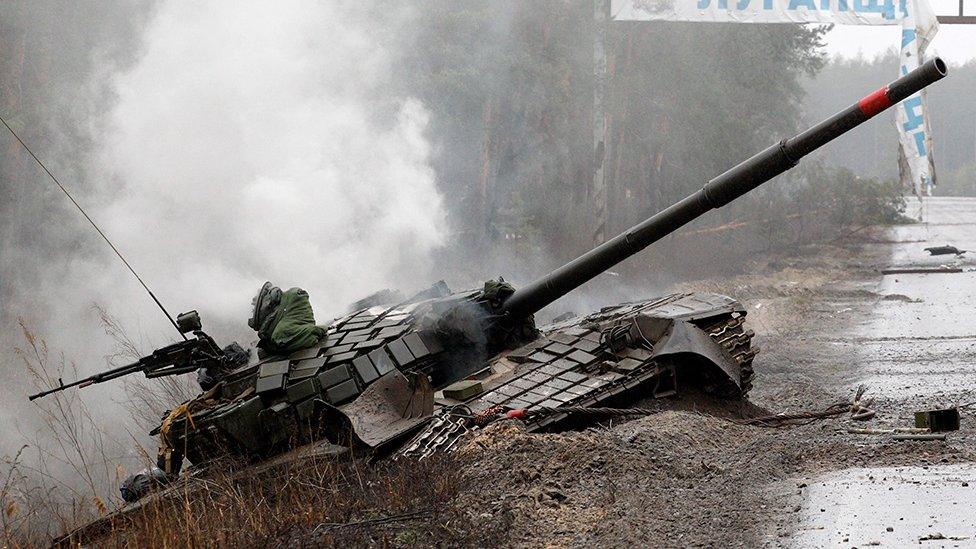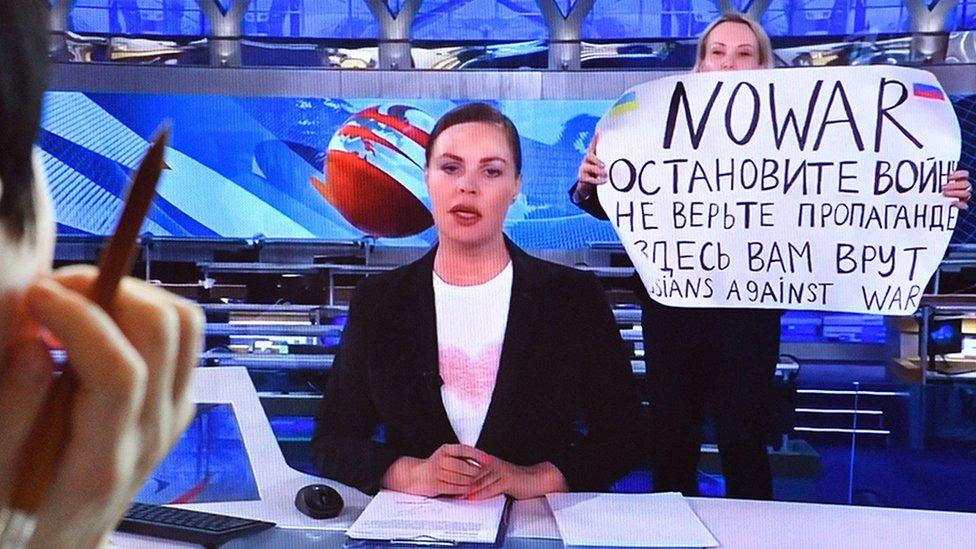Ukraine: Putin will search for a way to save face
- Published

Russian tank destroyed by Ukrainian forces in Luhansk
Even the worst war comes to an end. Sometimes, as in 1945, the only outcome is a fight to the death. Mostly, though, wars end in a deal which doesn't satisfy anyone entirely, but at least brings the bloodshed to an end.
And often, even after the worst and most bitter conflicts, the two sides gradually resume their old, less hostile relationship.
If we're lucky, we're beginning to see the start of this process happening now between Russia and Ukraine.
The resentment, particularly on the Ukrainian side, will last for decades. But both sides want and need peace: Ukraine, because its towns and cities have taken a terrible battering, and Russia, because it has already, according to the Ukrainian president, sacrificed more men and material than it lost in its two shockingly violent wars in Chechnya - although that is impossible to verify.
But no-one willingly signs a peace agreement which is likely to lead to their own downfall.
For Russian President Vladimir Putin the search is on for ways of saving face. Ukraine's President Zelensky has already shown remarkable skill as a diplomat, and he's clearly willing to say and do whatever is acceptable to himself and his people in order to get Russia off his country's back.
For him, there's one overriding objective - to make sure that Ukraine comes out of this appalling experience a united, independent country, not a province of Russia, which is what President Putin originally seemed to think he could turn it into.
For President Putin, all that counts now is that he can declare victory. No matter that everyone in his entire administration will understand that Russia has been given a bloody nose in this unnecessary invasion. No matter that the 20% or so of Russians who understand what's really going on in the world will know that Putin has bet the house on a fantasy of his own devising, and lost.
The battle will be for the support of the remaining majority of the population, who tend to believe implicitly what they're told on state television - even when there are moments such as the sudden popping-up on screen of the extraordinarily brave TV editor Marina Ovsyannikova with a placard to say that everything people are being told is propaganda.

So what will make President Putin come out of this disastrous war looking good in the eyes of Russia's majority?
Firstly, an assurance, perhaps even to be written into Ukraine's constitution, that it has no intention of joining Nato in the foreseeable future. President Zelensky has already prepared the way for this, by asking Nato for something it couldn't agree to (establishing a no-fly-zone over Ukraine), then criticising the alliance for letting him down on this, and finally musing out loud that he wasn't sure that if Nato behaved like this, it was actually worth joining.
As clever and wise political positioning goes, it doesn't get much better than this. Nato gets the blame, which it can easily cope with, and Ukraine gets the freedom to act as it wants.
But that's the easy bit. It'll be harder to finesse the urgent ambition which Zelensky and Ukraine have to join the EU, something Russia is almost equally hostile to, though there are ways around that too. Hardest of all for Ukraine to swallow will be Russia's outright theft of Ukrainian territory, in total defiance of the solemn international treaty it had signed to protect Ukraine's borders.
The loss of Crimea in 2014 is something Ukraine may well be forced to give its formal acceptance to, in some way. And Russia clearly intends to hang on to those areas in eastern Ukraine which are pretty much effectively under Russian control already - and perhaps more.
In 1939, Joseph Stalin invaded Finland, which had once been part of the Russian empire. He was sure his troops would carve their way through it in no time - just as Putin thought about Ukraine in 2022. Stalin's generals, understandably terrified for their lives, promised him he was right. And, of course, he wasn't.
The Winter War dragged on into 1940, the Soviet army was humiliated, and Finland was left with a justifiable national pride in itself for resisting a superpower. It lost territory, because autocrats like Stalin and Putin need to come out of these things looking as though they've scored a victory. But Finland kept the most important, most imperishable thing: its full independence as a free, self-determining nation.
As things stand today, Ukraine - having beaten off so many Russian attacks and made Putin's forces look feeble and ineffective - should be able to do that. Unless Putin's armies can capture Kyiv and much more of Ukraine's territory, then Ukraine will survive as a national entity, just as Finland did in 1940.
Losing Crimea and parts of eastern Ukraine would be a bitter, illegal and wholly unjust loss. But Vladimir Putin would have to start using far more serious weapons even than he has already, if he's to come out on top. As things stand, in the third week of fighting, no-one can seriously doubt who the real winner in this war will be.

John is the BBC's World Affairs editor. His weekly news programme, Unspun World with John Simpson, is broadcast on Wednesday evenings at 23:15 GMT on BBC Two, and on the BBC News Channel and BBC World News on Friday, Saturday and Sunday.

War in Ukraine: More coverage
